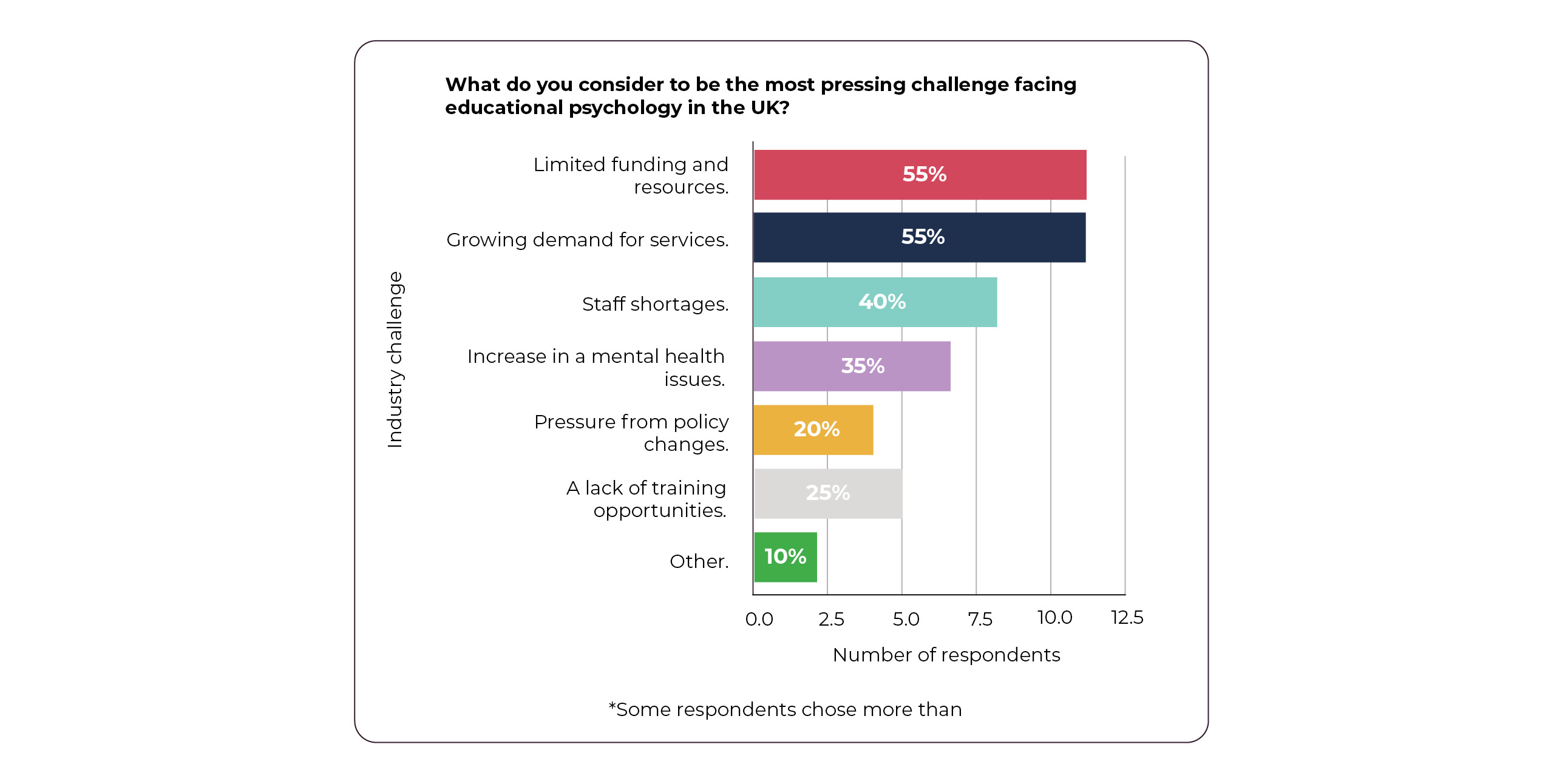SCG Educational Psychology Workforce Insights Report 2024
24 Feb, 20251-2 minutes
Introduction
2024 has been a pivotal year for the UK educational psychology sector and those who work within it.
As the demand for Educational Psychologists grows, so too do the challenges associated with the role. With a prevalent increase in mental health concerns amongst children and young people, 2024 has seen increased pressure on professionals to support children’s mental health.
As well as the challenges surrounding mental health, the sector has also faced navigating shifts in funding and policy in central government. This appears to have impacted job satisfaction within the sector, with only 35% of Educational Psychologists surveyed saying they are ‘very satisfied’ within their role.
Our report aims to uncover the challenges and opportunities that Educational Psychologists have experienced throughout the past year. Using data from practising Educational Psychologists, from both local authority (LA) and private sector roles, we explore insights and trends within training, funding, legislation and more throughout 2024.
How satisfied are you within your current role?
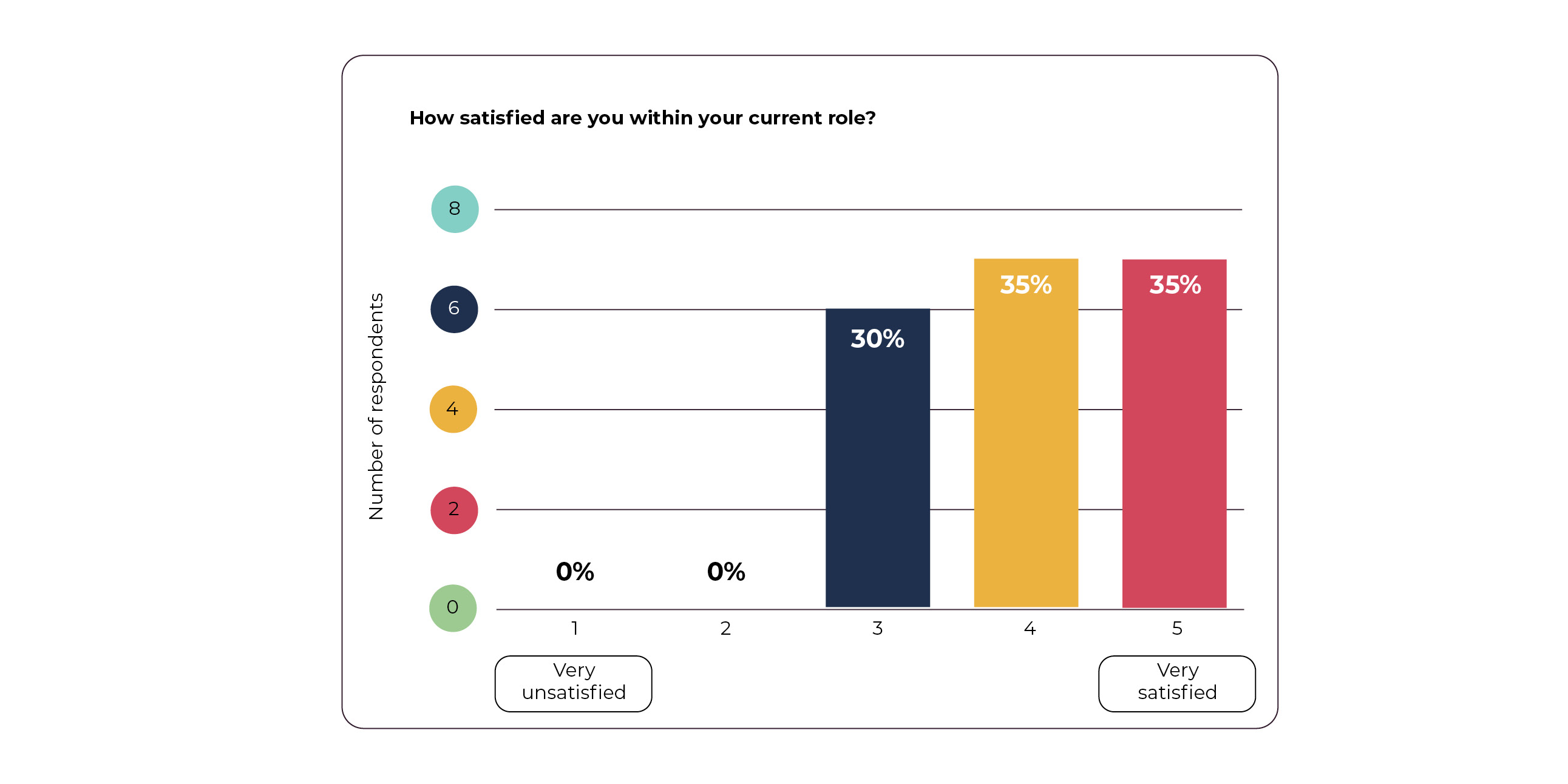
Key findings
- 35% of Educational Psychologists believe the demands of their role ‘always’ exceeds the time and resources available to them.
- Over half (55%) of Educational Psychologists said the location of a training provider in relation to their living arrangements is what compelled them to use the training provider they opted for.
- 75% of Educational Psychologists believe it is ‘very important’ to keep up with sector changes.
- The increasing speech, language and literacy needs of children and young people appear to coincide with the educational and social disruption caused by the Covid-19 pandemic.
- Educational Psychologists believe there is a lack of funding within the sector, especially within local authority.
- The use of technology appears to be increasingly prevalent within the sector with this used for streamlining processes and allowing Educational Psychologists to prioritise their attention.
- The use of Artificial Intelligence could be useful but Educational Psychologists believe certain tasks must be overseen by a human being.
- Despite challenges within the sector, many Educational Psychologists are motivated to continue by the positive impact they have on the lives of children and young people.
An overview of educational psychology in 2024
With 35% of respondents stating that the demands of their role ‘always’ exceed the time and resources available to them, it is clear that 2024 has been an exhaustive year for Educational Psychologists.
Based on the opinions collected throughout this report, there are varying reasons for this finding, including:
- There are not enough Educational Psychologists to cater for the demand within the UK. Latest government figures indicate that there are only just over 2,500 practising Educational Psychologists working for local authorities in the UK.
- The number of children needing support is outweighing the number of available Educational Psychologists. At the start of 2024, there were around 1.7 million school pupils in England who were identified as having special educational needs.
- The increased demand for Educational Psychologists means those in the role are spread too thinly and work ends up focussed on statutory assessments, rather than early intervention work.
- Educational Psychologists have to spend a lot of time completing administrative work rather than on the job in hand.
- The high demand for Educational Psychologists means that statutory assessments with deadlines cannot be completed effectively within the designated time frame.
- Some schools do not have the resources to meet the diverse needs of children within the education system.
- The report found that the growing number of Assistant Educational Psychologists is helping to increase capacity and manage demand; however, Educational Psychologists practising at assistant level typically need additional training and support which can increase the pressure on senior Educational Psychologists.
Training
Throughout 2024, the training required to practise as an Educational Psychologist has remained a demanding pathway.
Our report found that training and development opportunities across the UK can vary drastically and significantly. The report also uncovered that there are too few Educational Psychologists in training to meet the current demands of the sector.
One respondent claimed that an Educational Psychologist doctorate can be difficult to get on to and that more spaces are required to encourage more professionals to pursue this path.
There also appears to be concern that there is a reliance from universities on local authorities (LAs) to offer trainee placements and therefore, if there are disagreements about placement experiences, this could potentially damage relationships between institutions.
How would you describe the current state of training and professional development opportunities for Educational Psychologists in the UK?
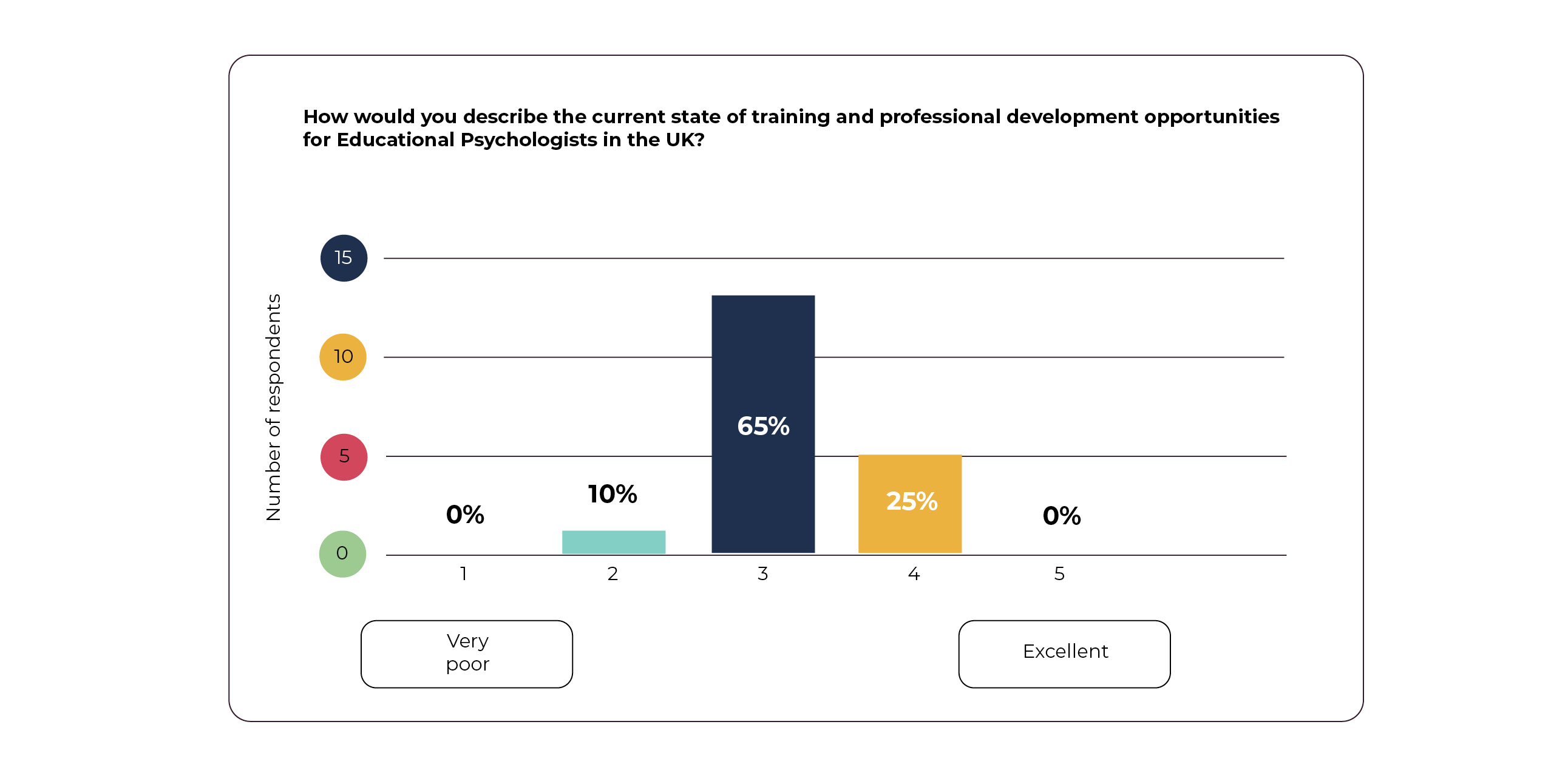
What compelled you to use the training provider you opted for?
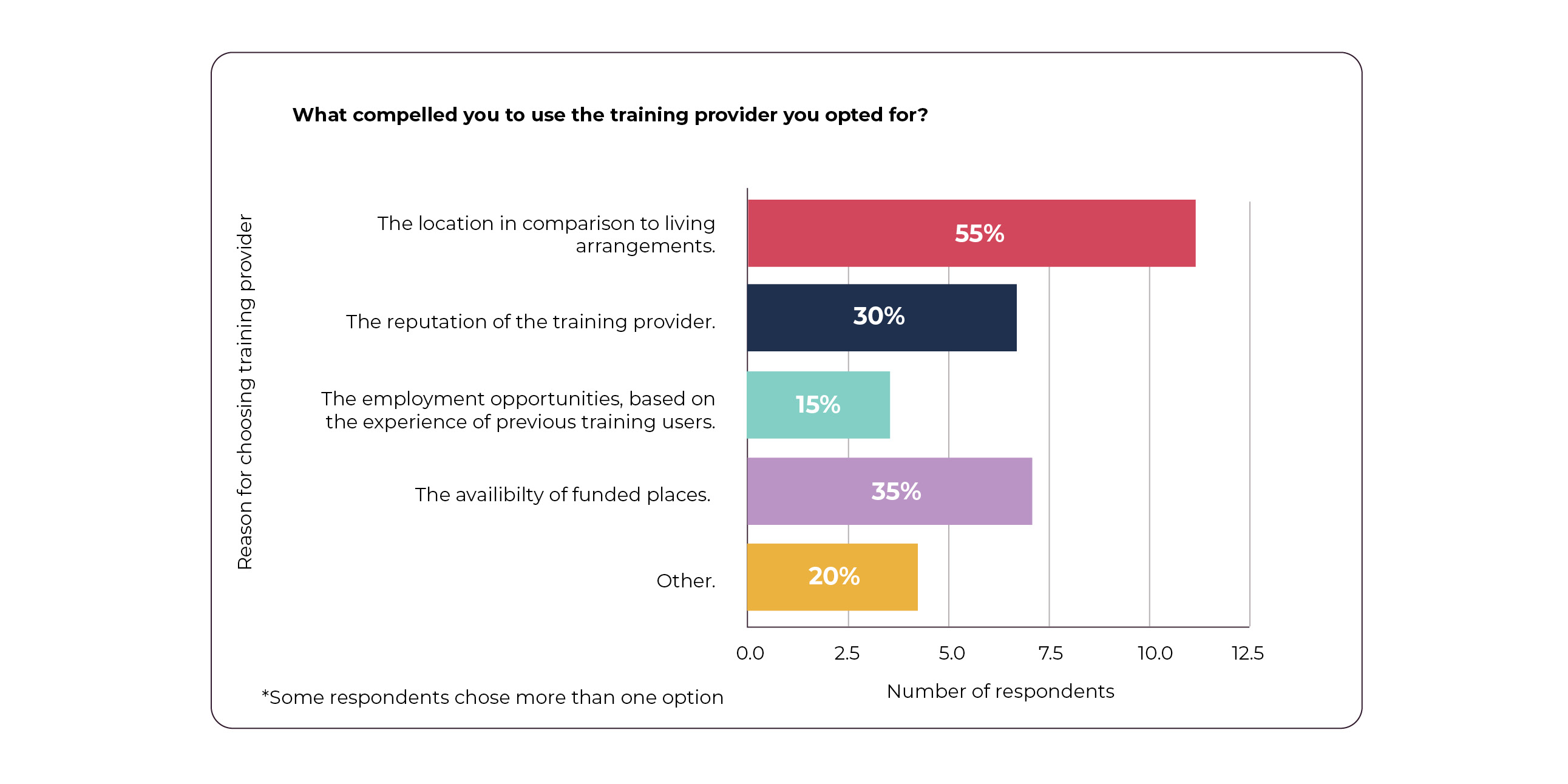
How satisfied were you with the training provided by your training provider?
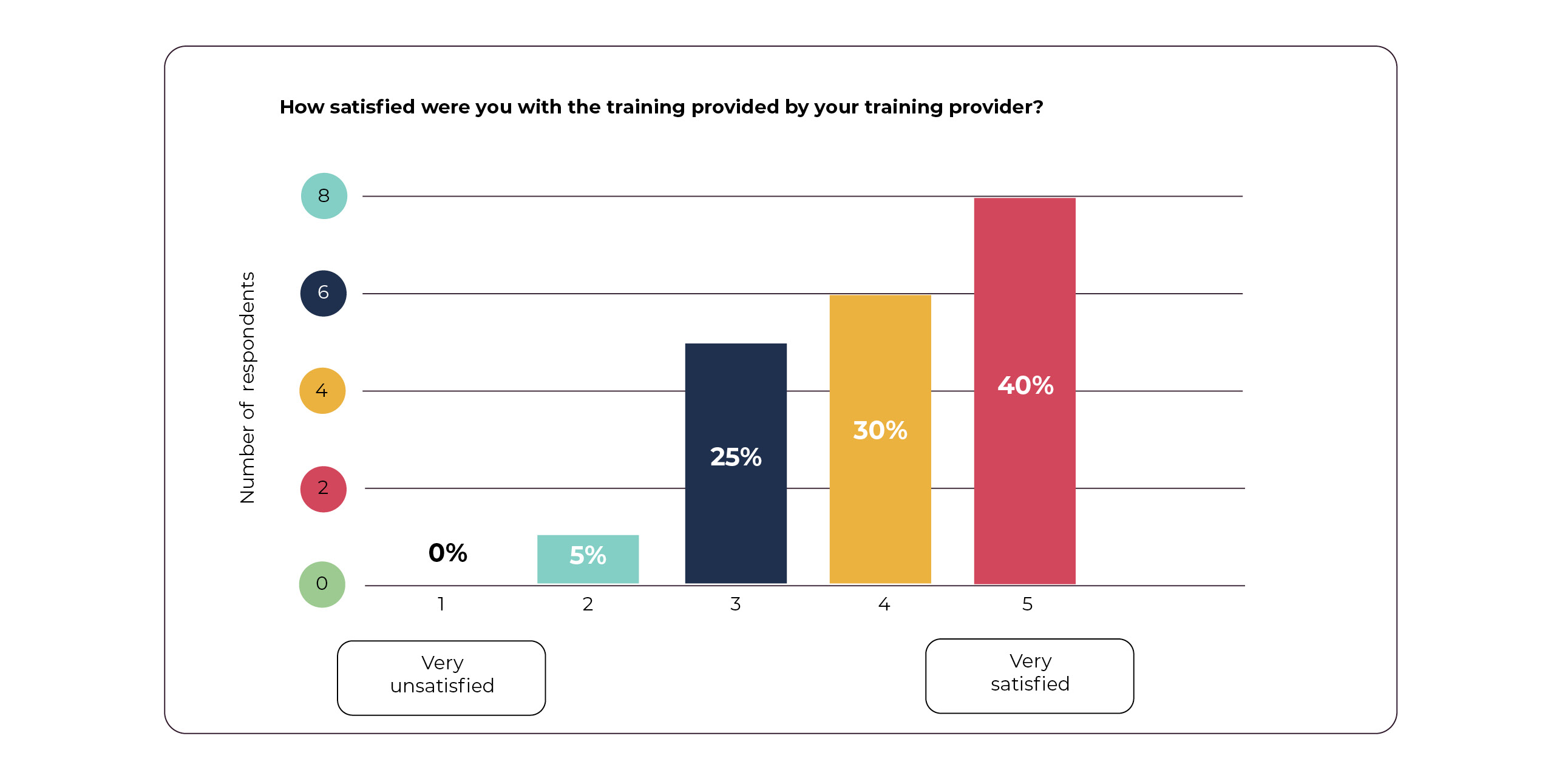
Our report uncovered mixed feedback surrounding the satisfaction of their training. Some respondents believe their individual training helped them to develop long term skills around reflection and practice.
However, others said that training could have covered more areas within educational psychology. One respondent even stated that the university lectures were excellent but support around placements was inadequate.
Do you believe there is adequate support for newly qualified Educational Psychologists?
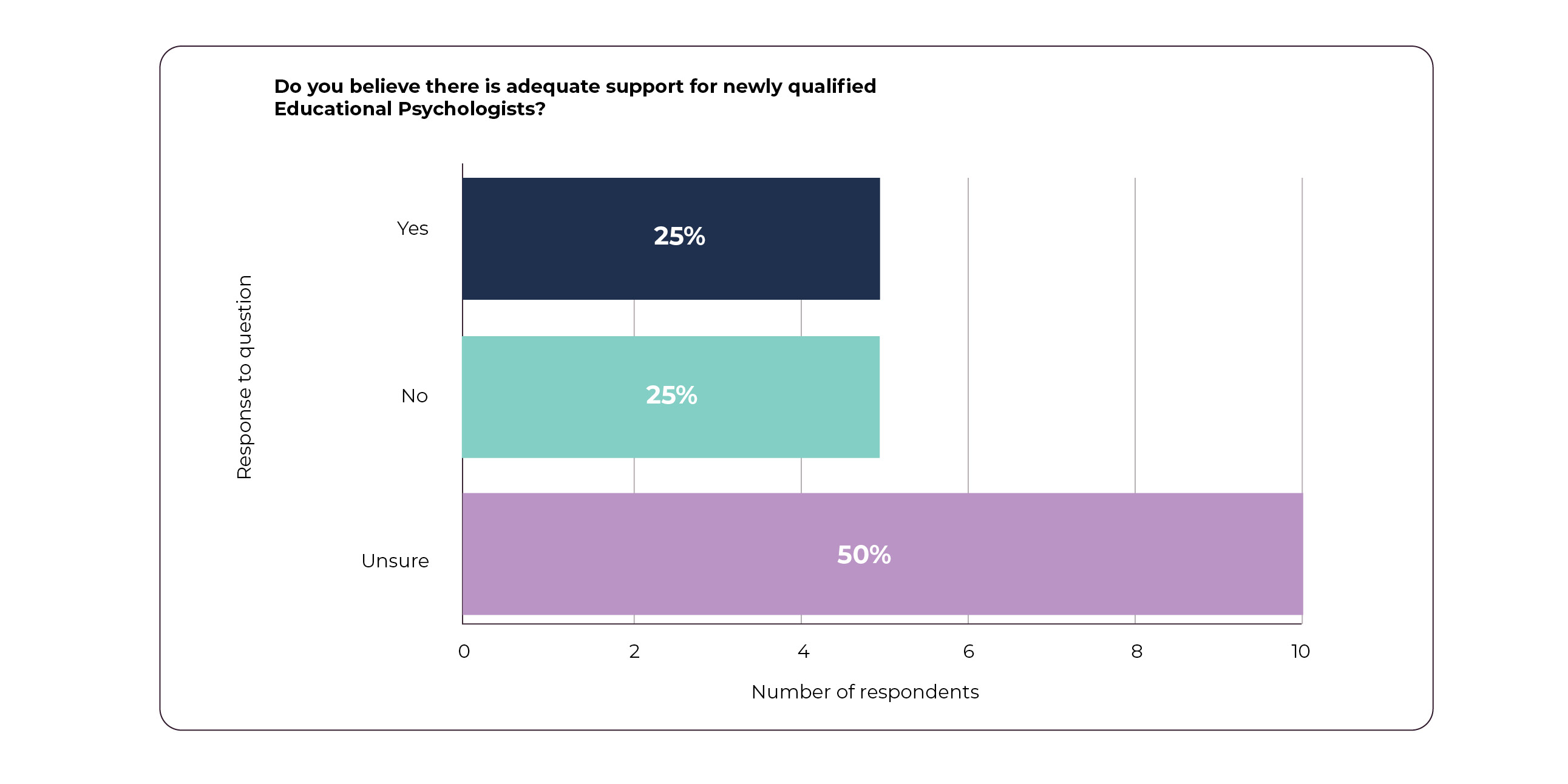
In regards to the support provided to newly qualified Educational Psychologists, our report found that feedback was mainly negative. Reasons why include a lack of opportunities for Continuous Professional Development (CPD). However, feedback did vary depending on the service a person worked with.
One respondent said, “They are overworked and not enough grace is given to the fact they are still learning the system.”
Another respondent stated, “No CPD offered. Every piece of CPD I completed this year has been through my own initiative and at my own cost.”
Trends within educational psychology
Throughout 2024, the educational psychology sector witnessed several prevalent trends including an increase in early intervention work, and the ongoing battle to support mental health in children and young people.
There have been rising concerns about the mental wellbeing of children and young people (CYP) since the Covid-19 pandemic and as a result, Educational Psychologists are now playing an increasingly important role in assisting schools to manage anxiety, depression and social challenges amongst their pupils.
Early intervention has also been an important focus for Educational Psychologists aiming to address the needs of children and young people, before they develop. Tailored approaches to support neurodiverse students and those with special needs have also been heavily advocated for.
Technology and online interventions are also becoming more prevalent within the sector, enhancing efficiency and accessibility for professionals. However, with the advancement of technology comes ethical and practical concerns that must be considered at all times.
Have you noticed any significant trends or changes in the needs of students and schools within the last 5 years?

Our report highlights that 75% of Educational Psychologists have noticed significant trends or changes in the needs of students and schools within the last 5 years. This includes a rise in Social, Emotional and Mental Health (SEMH) needs amongst children and young people, since the Covid-19 pandemic, especially those in early years.
One respondent said, “There is an apparent trend of speech and language and literacy needs which appears to coincide with the educational and social disruption caused by the Covid-19 crisis. This is notable in children aged between 4 and 10 years old.”
It’s worth noting that this claim is based solely upon children who are referred to them, rather than a representative sample of children within any given school.
Our report also highlights an increase in Emotionally Based School Avoidance (EBSA) and exclusions within schools, with some claiming that this is potentially linked to greater levels of anxiety within children and young people.
Respondents have also commented on the increase in Elective Home Education (EHE) and Autism Spectrum Disorder (ASD) - and the long waiting times for ASD assessments. The National Institute for Health and Care Excellence (NICE) recommends that assessments begin within three months of referral but waiting times can be longer due to high demand or limited resources.
How important do you think it is to keep up with sector changes?
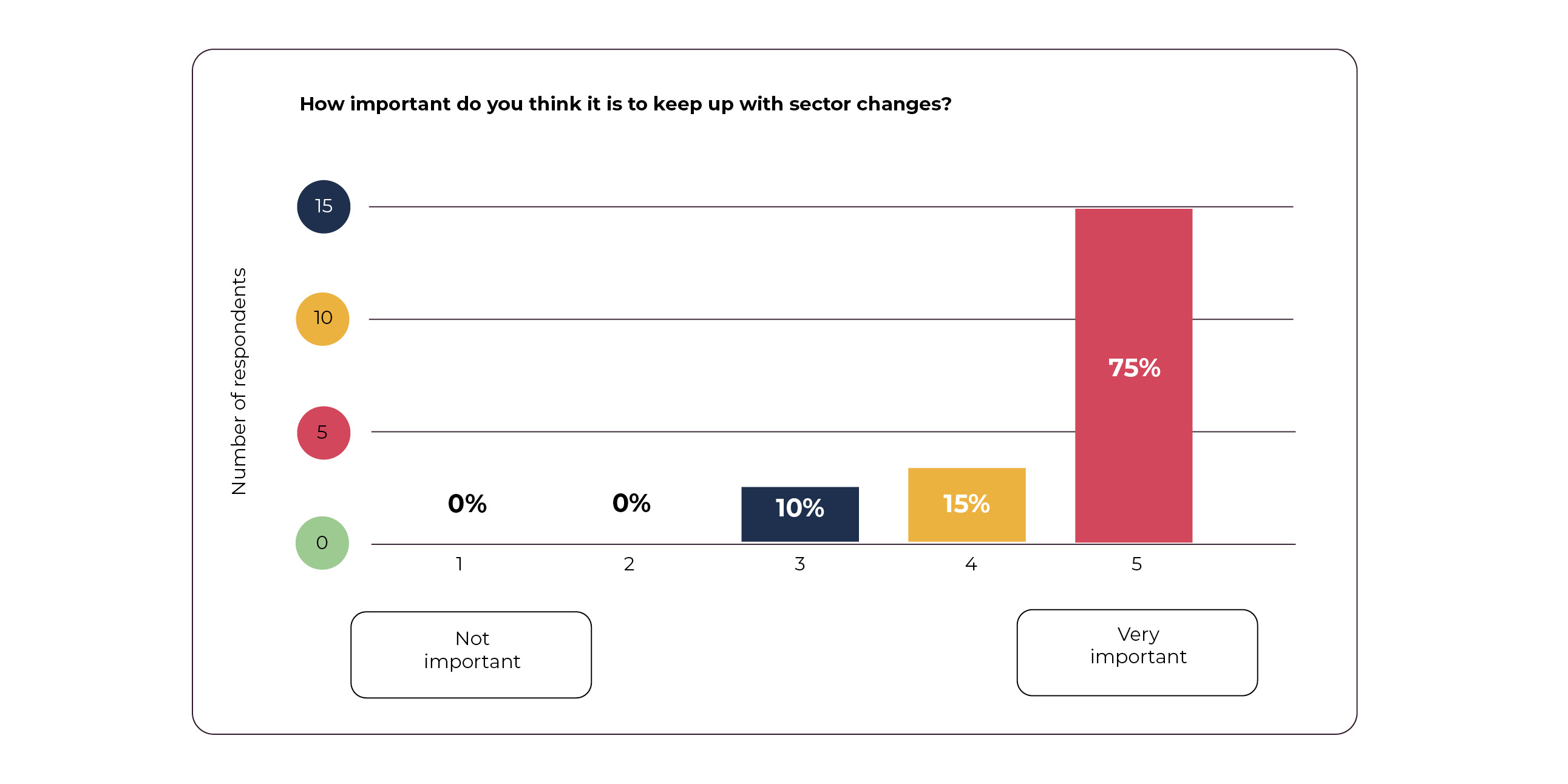
When asked their thoughts on keeping up with sector changes, respondents stated the importance of helping to steer change and diversifying within the profession. It was also noted that failing to keep up with sector changes might inhibit an Educational Psychologist's ability to provide up to date support for children and young people.
One respondent said, “With new governmental policies, legislature and local authority changes it is imperative to keep up to ensure your support is relevant and helpful.”
Educational Psychologists are advised to keep up with sector changes through practices such as attending Continuous Professional Development workshops, joining local and national networks of Educational Psychologists and joining professional bodies and organisations that provide access to workshops and webinars. These methods are also important for following and keeping up to date with industry trends.
The growing focus on mental health and wellbeing in schools
The mental health and wellbeing of children and young people continues to be a critical focus for schools. However, our report uncovered that some Educational Psychologists believe there is still not enough support for teachers to effectively manage and support the mental health of their students.
Our report also indicates that a focus on mental health and wellbeing cannot be tokenistic and there needs to be a leniency in the academic expectations placed upon students in schools.
One Educational Psychologist notes, “It feels hypocritical to tell schools that they should be prioritising mental health without acknowledging that, in some instances, this will mean that this takes precedence over pushing an academic agenda.”
The requirement for long term support into adulthood is also suggested with respondents commenting on the vast backlog of Child and Adolescent Mental Health Services (CAMHS) cases and the relationship between emotional wellbeing and cognitive development.
In order to continue supporting the mental health of children and young people in school, there must be access to trained professionals and adequate training for staff.
One respondent said, “Teachers and school staff are increasingly trained to recognise signs of mental health challenges and to approach students with empathy and understanding. This training is essential, as teachers are often on the front lines in observing changes in students’ behaviour.”
It appears that there has been a shift within the understanding of students' emotional and psychological wellbeing over recent years; however, if mental health challenges are left unaddressed, this might impact the overall academic performance of students, along with their ability to create social relationships.
Funding and resources
Regarding funding and resources available for educational psychology services, our respondents believe that on the whole, both are lacking. This appears to be particularly prevalent within local authority.
A lack of funds and resources appear to be having a knock on effect to the training and retention of Educational Psychologists, and the number of assessments local authorities are completing.
Recent government figures indicate that 84,428 new EHC plans started during 2023, an increase of 17,722 (26.6%) from 2022. As of January 2024, 575,963 EHC plans were in place, an increase of 58,914 (11.4%) from January 2023.
However, the government's own figures indicate that only 50.3% of EHC plans are issued within the statutory 20 week time frame.
One respondent said, “EP services are grossly underfunded given the demand for them from schools and parents. The EHC (Education, Health and Care) system has contributed to this and has arguably restricted and de-skilled the profession as statutory assessments have come to dominate workloads.”
This viewpoint is reflected by another respondent, who said, “Services are underfunded and there is too much pressure on statutory work.”
Our report also found that Educational Psychologists are limited by the funding that schools have for their services. One respondent said, “Each term the number of statutory (assessments) that can be offered is reduced, meaning less children are able to be seen and supported. That effectively is straining EPs and schools and impacting families as a whole.”
The lack of current funding and resources within the sector, alongside the increased demand for services is piling the pressure on those practising within the profession. Funding uncertainties can also make it increasingly difficult for local authorities to recruit and retain Educational Psychologists.
Industry challenges
Throughout 2024 there have been a number of challenges that the educational psychology sector has had to navigate, from those driven by a shift in societal needs to the increasing demand for the expertise of Educational Psychologists.
Our report found that the majority of Educational Psychologists believe that limited funding and resources and the growing demand for services are the most pressing challenge currently facing educational psychology in the UK.
What do you consider to be the most pressing challenge facing educational psychology in the UK?
Staff shortages emerged as a key difficult challenge for the sector with one respondent stating, “Staff shortages and an increase in demand is often overwhelming for the services.” Another respondent said, “Without the capacity to meet the need for statutory roles, EPs cannot engage in wider work and have to bring in locums at great cost.”
Competition between the public and private sector
The competition between local authorities and private providers could also be creating a challenge within the sector, due to resource disparities and the privatisation of services.
Private providers are usually able to offer higher salaries and better working conditions which creates immense challenges for local authorities to compete with and retain their top talent. As a result, the public sector faces the prospect of losing too many experienced professionals which will only exacerbate other problems - such as a rise in demand for their services.
Social media
Social media was also outlined as a unique challenge for Educational Psychologists. As children and young people continue to make frequent use of social media sites such as TikTok and Instagram, this could be having a negative impact on their social and emotional development.
On what level do you agree with this statement? ‘Educational psychology services are able to meet the needs of children and young people today’.
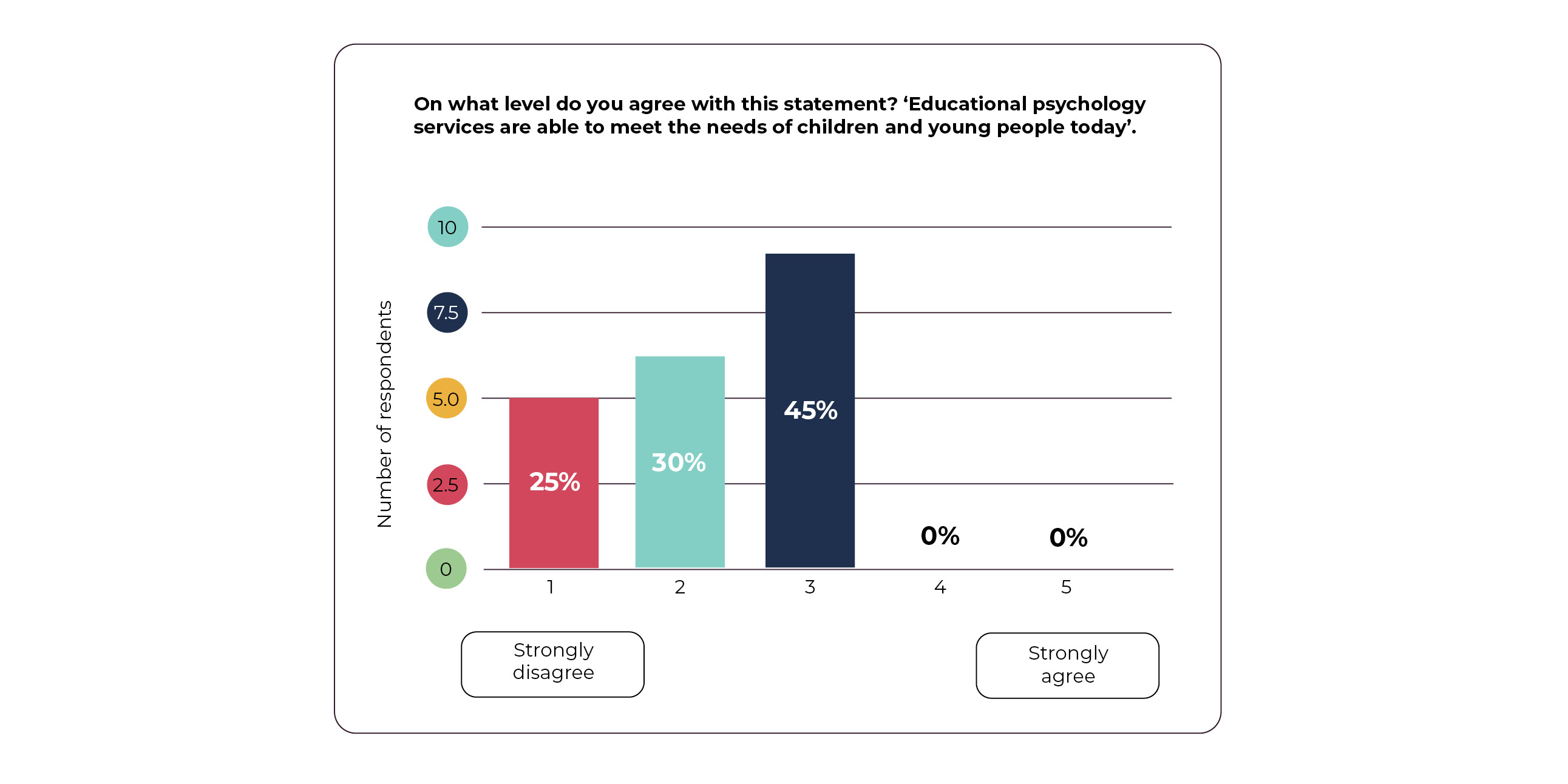
Our report highlights a concerning trend that practising Educational Psychologists don't believe that services are meeting the needs of children and young people. Largely this is due to the demands on Educational Psychologists outweighing the number of Educational Psychologists available throughout the UK.
Our report uncovered critical areas of improvement which Educational Psychologists believe need to happen:
- Educational Psychologists work very hard in their roles but they are not able to be their most effective under current service demands.
- There aren’t enough Educational Psychologists to meet demand in local authorities or nationally and there aren’t enough being trained.
- There are too many Education, Health and Care Needs Assessments (EHCNA) and no time for preventative work or research.
- Too many requests related to Education, Health and Care (EHC) prevents Educational Psychologists from supporting children, schools and parents/guardians.
- An ever growing, diverse population means there needs to be more funding for Educational Psychologists to ensure they can qualitatively support children and young people.
- Educational Psychologists are not used to their fullest and could be much more involved in intervention work.
Have you faced any barriers in finding the type of role you wanted? If so, why do you think this was?
Despite the demand for Educational Psychologists across the UK, some have still struggled to find the type of role they were looking for. Reasons for this include a lack of funding and resources within the sector and local authorities (LAs) not offering the flexibility that private organisations do.
One respondent said, “I have had to set up privately to create the role I wanted because LAs don’t offer it.”
Another respondent said, “I work directly with a school (privately) so I negotiate with them about what sorts of work I can do for and with them. This has been established over many years.”
A third respondent stated, “It was difficult to find a role in the local authority, but I was able to find a role with a private service. Local authority funding has reduced job availability.”
These statements indicate that working within private practice appears to offer more flexibility and enhanced work opportunities over local authority roles.
Are there any gaps in service provision that you feel need urgent attention?
From assigning an Educational Psychologist to every school, to a greater focus on consultation at service level, our report uncovered a varied response with multiple suggestions.
Respondents have made it clear that there should be more support for families surrounding Special Educational Needs (SEN) and the process of Education, Health and Care Plans (EHCPs).
This is echoed in the suggested need for greater support directed at schools, teachers and parents/guardians, covering general advice surrounding educational psychology.
Other suggested gaps in service provision from respondents include:
- Mental health assessment resources for teenagers.
- More Educational Psychologists to support schools policies and judge appropriate responses to children’s needs.
- Having a sufficient number of Educational Psychologists to meet the demands for schools in a financially accessible way for both a local authority and the school.
- Being able to access pupil support services and having the appropriate provisions, such as specialist provisions, available.
Policies and legislation
Throughout 2024, the UK educational psychology sector has witnessed changes and updates within policy. In 2024, we gained the first labour government in 14 years, after they returned to power with a 174 seat majority in the 2024 General Election. Since their reelection, the Labour government has outlined a series of plans aimed towards transforming Special Educational Needs and Disabilities education throughout the United Kingdom.
Their focuses include requiring all schools and local authorities to collaborate on school admissions, SEND inclusion and place planning and providing access to specialist mental health professionals in all schools. Their plans also include a ‘community wide approach’, hoping to improve SEND expertise and inclusivity within mainstream schools in the UK.
Do you feel that current UK education policies adequately support the needs of students with Special Educational Needs and Disabilities (SEND)?
The general consensus is that current UK education policies aren’t adequately supporting the needs of students with Special Educational Needs and Disabilities. Once again, our report uncovered a varied response with multiple suggestions.
One Educational Psychologist stated, “Teachers are not equipped to deal with trauma and children with behavioural issues are subject to disciplinary procedures, particularly in secondary schools.”
Another respondent speaks specifically about the CFA, saying, “The Children and Families Act can be exploited as the (terminology) ‘may have SEN’ is too vague. This means statutory assessments can take place even when they are not really warranted.”
There is also a viewpoint that the SEND Code of Practice needs updating. One respondent said, “The Code of Practice needs updating, expectations don't match reality, huge groups of young people whose needs are not being met and who are getting lost in the system or are missing from education entirely.”
Having said this, one respondent points out that if implemented correctly by the setting, then UK education policies can adequately support the needs of students with SEND.
On what level do you agree with this statement? ‘Educational Psychologists have an adequate input in shaping educational policies’.
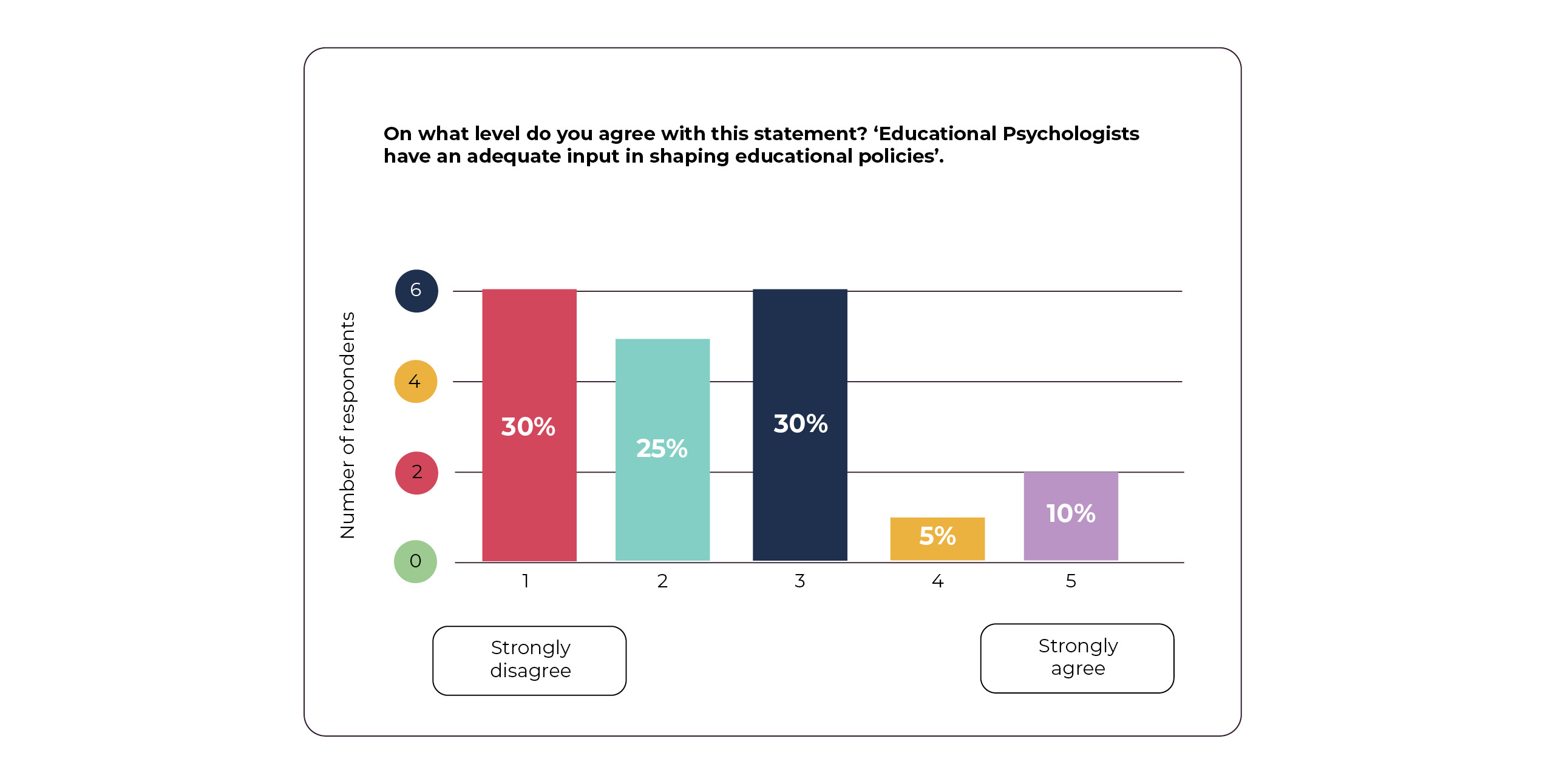
Our report highlights that the majority of respondents don’t believe they have adequate input in shaping educational policies. One respondent said, “We are the most professionalised workforce in education but rarely do we influence the Department for Education (DfE) or legislation development. When we are consulted, it is often vague our contribution.”
Another said, “We should be more involved as we hold a unique position in education.”
Another added: “To my knowledge, there are no EPs included in the newly initiated curriculum review. This represents an oversight by policy makers and missed opportunity for the expertise of EPs to be included in an important national conversation.”
Collaboration between Educational Psychologists and other professionals
Throughout the UK, Educational Psychologists work closely alongside Teachers, Special Educational Needs Coordinators (SENCOs) and other educational professionals to ensure the best outcomes for children and young people.
Educational Psychologists must collaborate with other education professionals in order to provide tailored interventions and efficiently assess the learning and emotional needs of children and young people.
On what level do you agree with this statement? ‘Legislative framework supports multidisciplinary collaboration between Educational Psychologists and other professionals’.
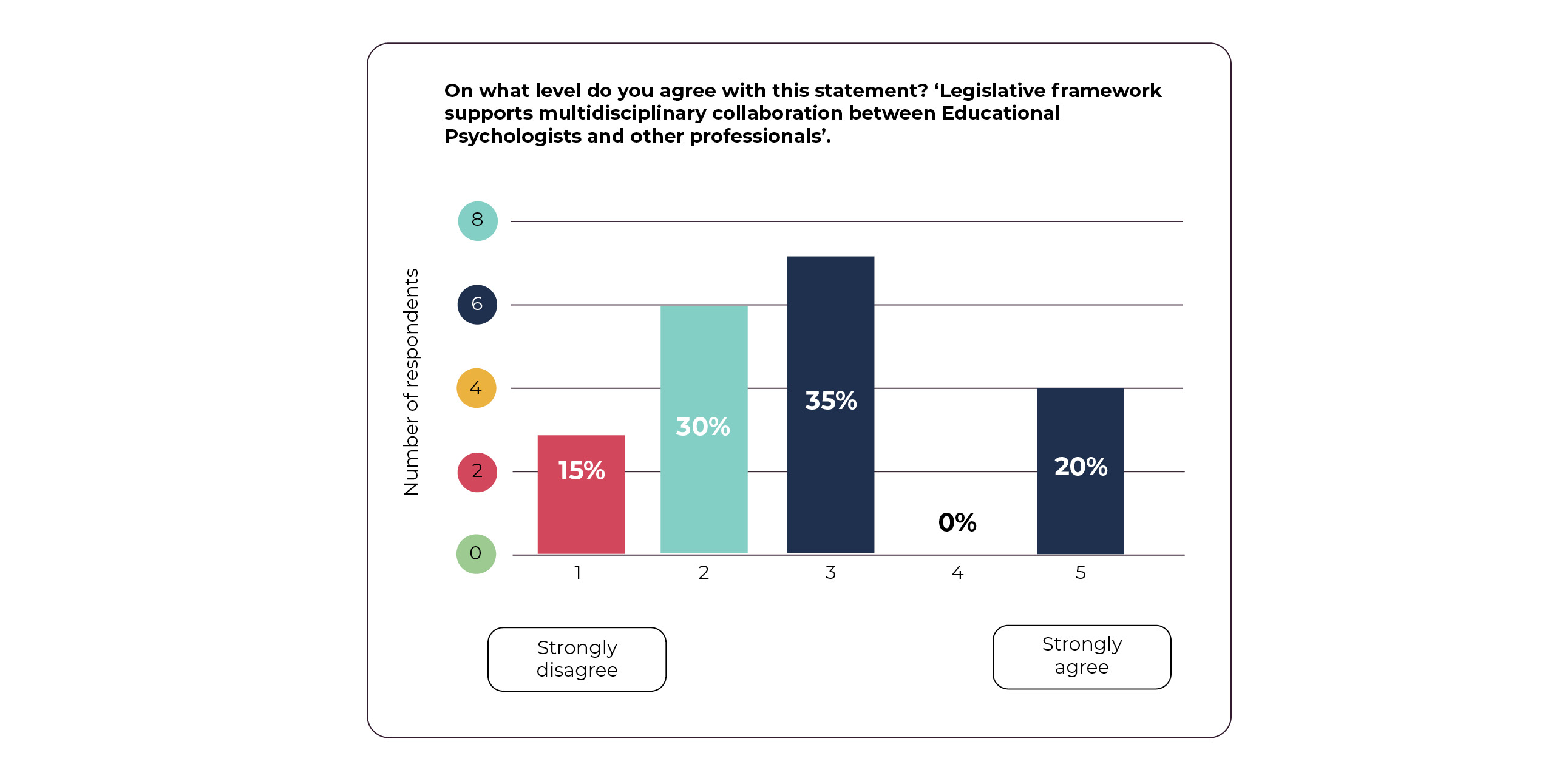
When asked their thoughts on legislative framework supporting multidisciplinary collaboration between Educational Psychologists and other professionals, our respondents raised the following points:
- In theory, legislative framework supports multidisciplinary collaboration between Educational Psychologists and other professionals, however this is not reflected in practice.
- EHCNAs encourage collaboration however, this is not enforced so it doesn’t happen as often as it should.
- The ability to work in a multidisciplinary way is significantly curtailed due to pressures to deliver statutory advice and meet school based quotas for assessment and support. There is a longer term need to help schools and other agencies work more collaboratively.
- It focuses on direct assessment in practice. It tries to be multidisciplinary but it’s not effective in implementing it.
Overall, it appears that in theory, collaboration between educational professionals is necessary and should be possible, however this can be difficult to implement in practice.
Technology within educational psychology
Technology has played a pivotal role within the educational psychology sector during 2024. Digital tools, including online assessments and data analysis software, have helped to streamline the evaluation of children and young people’s cognitive and emotional needs.
With technology playing an integral part in the everyday role of Educational Psychologists across the UK, advancements show no sign of slowing down and technology is likely to progress over the coming years, particularly in the area of Artificial Intelligence (AI).
However, our report uncovered that while Educational Psychologists see the potential that AI could bring, there is a long way to go yet in implementing it effectively.
How do you foresee technology influencing the field of educational psychology in the coming years?
Our report found that respondents believe Artificial Intelligence (AI) will play an important role within the industry for tasks such as summarising data and writing reports. However, the requirement for a human being to oversee and check the work of Artificial Intelligence within educational psychology is paramount.
One Educational Psychologist said, “Potentially for AI to support with suggestions about strategies and provision, although I think it will always be necessary for this to be further considered and adapted by an Educational Psychologist in person.”
Suggestions from respondents for the use of Artificial Intelligence include:
- AI might be used to write Education, Health and Care Needs Assessments.
- AI might be used to summarise data into written, accessible reports.
- There is potential for AI to support with strategies and provision, although it might be necessary for this to be further adapted by a real Educational Psychologist.
Thoughts from respondents on the role of technology within educational psychology include:
- Technology could provide opportunities for children and young people who experience Emotionally Based School Avoidance (EBSA).
- Technology has the capacity to support Educational Psychologists by reducing the administrative demands of the role.
- There is significant potential for technology to help Educational Psychologists if it can be developed ethically and with legislative compliance around data protection.
- Technology will hopefully make it easier to facilitate wider reaching collaboration. For example, projects that have national reach.
- Technology might not help as much as it is being claimed.
In regards to technology reducing the amount of administrative work associated with the role, this could allow Educational Psychologists to devote more time to ‘front line’ jobs such as working collaboratively alongside teachers, parents/guardians and students.
The need for technology to be developed alongside legislative compliance and in an ethical manner is also important for protecting the rights and privacy of students and educators who Educational Psychologists work alongside.
Data must be handled responsibly and where technology is involved, it is essential that ethical and legal practices are adhered to, to safeguard individuals and uphold standards within the sector.
The future of educational psychology
From rapid technological advancements to the increased focus on mental health in children and young people, the role of Educational Psychologists is continuously expanding and becoming increasingly multifaceted.
If you could change one aspect of educational psychology in the UK today, what would it be and why?
A key theme from respondents centred around the increased need for training and accessibility. One respondent said, “(I would make) the course a little more accessible for those that want to train.”
This is echoed by another respondent who said, “(I would) increase funding to pay for more EPs to be trained.” This respondent also commented on salaries within local authority, saying, “(I would) increase LA salaries to counteract the financially unsustainable drift towards expensive locum work, which while beneficial for individual EPs, is unsustainable in the long term.”
Other suggested changes from our respondents include:
- Implementing a greater focus on consultation at the strategic level for a range of services that directly support children and move away from assessment.
- Increasing the level of engagement with research to help support and develop new interventions and programmes.
- More frequent school visits in order to share information, build trust and create responsive relationships with clients.
- Less focus on assessments, including statutory assessments, and greater focus on intervention work.
- End traded services and implement mandatory systemic support for all schools.
- Improve salaries in order to retain professionals.
- Create a better EHCP process.
What motivates you to continue working in educational psychology?
Despite the challenges facing the educational psychology sector, it’s clear from our report that many Educational Psychologists are dedicated to the important role they play for children and young people. One respondent said, “I can make a real difference for children, teachers and parents who feel confused, upset and worried about their children’s needs, development and progress.”
The desire to help others and have a positive impact on the lives of teachers, parents/guardians and students is also evident throughout our research. One respondent said, “I have a passion to work with children and believe everyone has the right to success in any way that they can.”
Respondents also commented on the support that Educational Psychologists are able to provide to each other and the intellectual challenge that working in such a position maintains.
Despite 2024 being a challenging year for the sector, Educational Psychologists remain determined to make a positive influence in the lives of children and young people, their families and their schools.
What skills or areas of knowledge do you think are becoming increasingly important for Educational Psychologists?
From developing an understanding around Artificial Intelligence to mental health awareness, it’s evident from the responses that there are a number of topics gaining momentum within the sector.
Social, Emotional and Mental Health (SEMH) and how to manage it appears to be an area that Educational Psychologists are increasingly having to deal with. Some have attributed this to Covid-19 and the impact of lockdown on the social skills of children and young people.
Important areas of knowledge also suggested by our respondents include:
- Autism and Attention Deficit Hyperactivity Disorder (ADHD) awareness.
- Social, Emotional and Mental Health awareness.
- The law surrounding educational psychology.
- The effects of the Covid-19 pandemic and subsequent lockdowns.
- Anxiety associated with trauma.
- Strategies to help parents/guardians effectively support children and young people.
Conclusion
To conclude our report, it is clear that 2024 has been a challenging year for Educational Psychologists throughout the UK, whether they are newly qualified or have practiced the profession for many years.
From the lack of funding and resources across the sector to the rising demand for Educational Psychologists, the challenges have varied and job satisfaction has been on the line as a consequence.
What is clear from the report, is that Educational Psychologists feel strongly about the support they require in order to carry out their role effectively and meet the needs of children and young people with special educational needs.
With evolving policies, Educational Psychologists are required to keep on top of changes within the sector in order to fulfil their role and provide the highest standard of support to those with SEND, whether they work for a local authority or private practice.
The rise of Artificial Intelligence has the potential to make big changes in the future but how long this will take to test, implement and be used as ‘standard practice’ remains to be seen.
Suggestions from our respondents highlight how Artificial Intelligence could be used for summarising data into written reports, however Educational Psychologists are clear that some tasks, such as suggesting strategies and provision, should be overseen by a human being.
What remains clear is that despite the challenges and changes across the sector, Educational Psychologists continue to love their job and the positive impact they have on the lives and education of children and young people, their parents/guardians and teaching professionals.
Methodology
The data within this report was collected via an online survey created by Spencer Clarke Group, published through Google Forms.
The online survey was distributed to Educational Psychologists (EPs) across the UK, via email and LinkedIn. The survey was answered by twenty Educational Psychologists of varying experience and both Educational Psychologists working within local authority and those working for a private practice.
Both the qualitative and quantitative research method was used to collate information. Utilising both research methods enabled us to explore a range of perspectives, generate new hypotheses, spot trends and anomalies, and uncover societal trends.
Glossary
AI - Artificial Intelligence
ADHD - Attention Deficit Hyperactivity Disorder
ASD - Autism Spectrum Disorder
CAMHS - Child and Adolescent Mental Health Services
CFA - Children and Families Act
CPD - Continuous Professional Development
CYP - Children and Young People
DfE - Department for Education
EBSA - Emotionally Based School Avoidance
EHC - Education, Health and Care
EHCP - Education, Health and Care Plan
EHE - Elective Home Education
EP - Educational Psychologist
EHCNA - Education, Health and Care Needs Assessment
LA - Local Authority
NICE - National Institute for Health and Care Excellence
SEMH - Social, Emotional and Mental Health
SEN - Special Educational Needs
SEND - Special Educational Needs and Disabilities
Educational Psychologist jobs
If you’re searching for your next Educational Psychologist job, why not take a look at the latest vacancies, or simply upload your CV to be notified when a relevant position becomes available.
Struggling to recruit Educational Psychologists?
As specialist local authority SEND recruiters, we support local authorities nationwide with their temporary, interim and permanent staffing needs.
If you’re struggling to recruit, we have exclusive access to some of the most experienced interim Educational Psychologists in the UK.
Simply contact Natalie Boaler on 01772 954200 to discover how we can help.
Who is Spencer Clarke Group?
Established in 2017, we’re an award winning and progressive recruitment agency based in the heart of the North West. Our reputation is built on trust, expertise and an unwavering commitment to exceed expectations.
In 2024, we were named Recruitment Agency of the Year at the prestigious Recruiter Awards, an accolade we are extremely proud of.
We operate in two sectors:
In eleven specialisms:
Healthcare, Social Care & Nursing
Corporate Functions & Business Support


